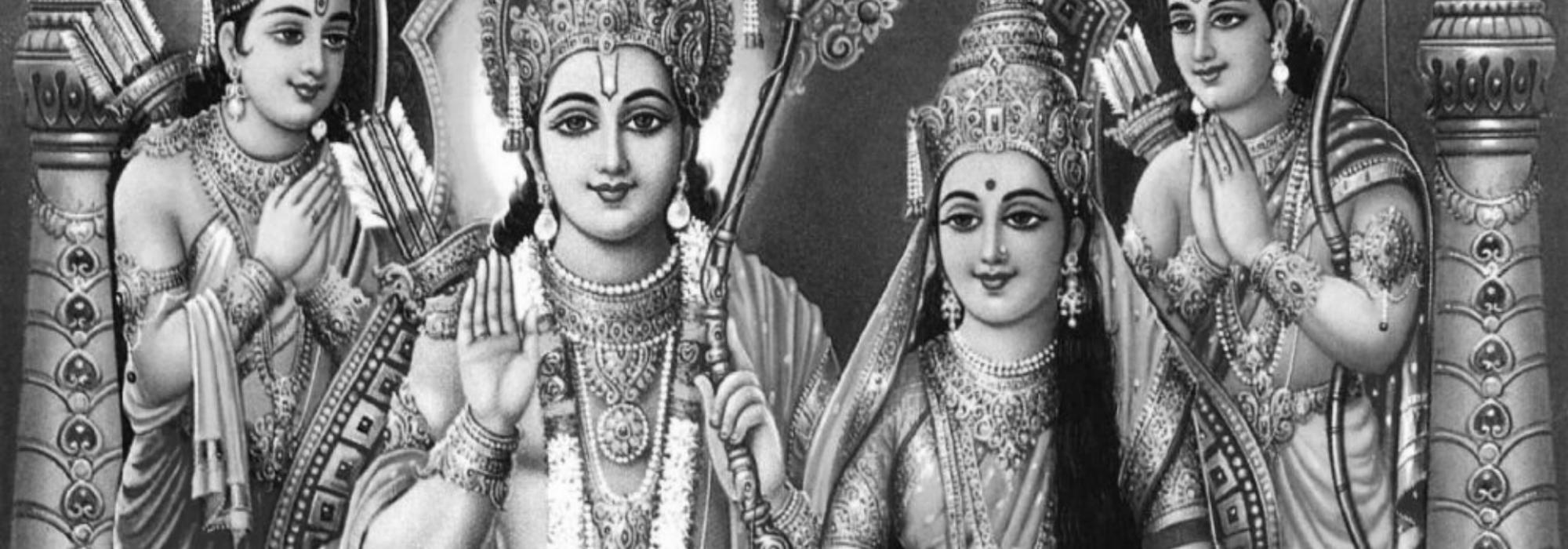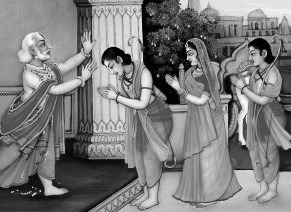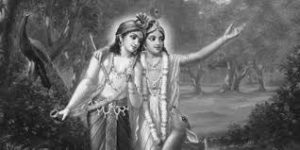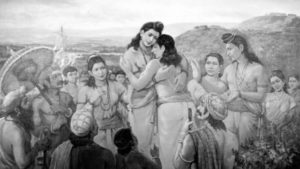When we discussed about Shiva, a lot of symbols were invoked. Instead of taking Shiva’s form and attributes at face value, we explored the metaphor. The reason for this is quite simple: human beings are abstract. They are so hard to grasp. It is so difficult to wholly understand an individual. But societies are more tangible – or at least we feel that we can see it better, in a more concrete manner.
In our tradition, Shiva has no avatāra. Vishnu has many incarnations but not Shiva. What is the reason behind this? When we live in a family or when we are a part of an organization, we have to play different roles. But when we are alone, just with ourselves, we don’t have to put on an act. We are just as we are. Shiva is that ideal at the level of an individual.
Rama is largely a family man. It becomes quite clear when we take a look at the Rama story. In the psyche of the common man, it is the life-journey of Rama that is prevalent and not that of Krishna or Shiva. Rama has caught the imagination of our people like no other hero. Just as an example, see the number of people who perform a pārāyaṇa (reading out aloud, reciting, studying) of the Rāmāyaṇa and compare it with those who do a pārāyaṇa of the Mahābhārata. The latter is insignificant in front of the former. In fact, there is also a notion that one should not have the entire text of the Mahābhārata, for it will give rise to family duels. We find people who perform pārāyaṇa of the Bhāgavata but the Krishna in that work is not the Krishna of society. He’s a child, involved in divine antics. It is the Krishna of the Mahābhārata that is important for our purpose.
Our people are quite lax about the country; they care more for family. This is particularly true in the last thousand years. Even in politics, we see so much of dynastic politics in India. In the West, it is quite the opposite I feel. The national and societal awareness is quite high while the family is not as important. However we need both; we can’t sacrifice one at the cost of the other.
Rama won the hearts of our people so easily but not Krishna. And even with Krishna, it was the butter-stealing baby and the flute-playing romantic that appealed to us and not the shrewd political mastermind who fought for dharma. This is perhaps one of the main reasons why we have had to face a string of defeats at the hands of barbaric foreign invaders over the past millennium. It is therefore essential for all of us to cultivate the Kṛṣṇa-prajñā, the ‘mind of Krishna’ or the ‘awareness of Krishna.’
Rama’s focus on family was wide-spread and all-encompassing. We see this right from his birth. He was born among much anticipation and expectations. He was to be the scion of the Raghuvaṃśa. In the Rāmāyaṇa, Dasharatha was perhaps more upset about not having a son rather than being concerned about Ayodhya being kingless after his time. He undertook the putrakāmeṣṭi-yāga driven by family-motivation rather than social consciousness. In fact, the vision of the epic itself is that one needs a son for the family.
We see many differences in Krishna’s story. When Devaki and Vasudeva had to give their child off to Nanda, they don’t lament. They give away their child with the feeling that such a thing was ordained for them and they must fulfil their duty. Krishna too never grieves about being raised by foster parents while his biological parents were alive. Contrast this with Dasharatha’s emotional flood when Vishvamitra takes away young Rama and Lakshmana!
When he gets married to Sita, Rama is happy that she is one whom his father has chosen. He was happy that Sita was a girl who brought delight to his parents. This is so typical of an Indian family: an arranged marriage – a brāhma-vivāha – with a girl chosen by the boy’s parents. Apart from respecting his parents, Rama also loved his brothers deeply.
Krishna, on the other hand, had a certain respect for Balarama but they didn’t have great mutual affection. In fact,
they have divergent views on several topics. But Rama’s siblings loved and respected him a great deal and on his part, Rama conducted himself in a befitting manner. When Kaikeyi asks Dasharatha for the two boons, Rama has no qualms about accepting the mandate. He knows that Bharata too would be a good king, just as he would have been. Utmost on Rama’s mind was that his father’s words must be honoured. The world should not remember Dasharatha as one who went back on his word. Rama also wanted to make sure that Kaikeyi was happy.
A careful observation of this episode will reveal a societal angle. Rama ensured that the larger establishment was not affected. If the king’s words prove to be false—particularly in the case of his favourite wife—then the people of the land will lose faith in their king. If people lose faith in the establishment, they will not act with larger welfare in mind but instead toil after their own safety and security. Rama had observed this; he realized that it was only a person who could succeed at the level of family could hope to succeed at the level of society. Thus, in the Rāmāyaṇa, the family is at the forefront while society is in the background.
Rama is compassionate but firm. At the point when Kaikeyi doubts if Rama will go to the forest, he says curtly to her, “O queen! I don’t care about wealth. I care about people. I am equal to a ṛṣi, adhering to dharma alone!”
नाहमर्थपरो देवि
लोकमावस्तुमुत्सहे ।
विद्धि मामृषिभिस्तुल्यं
केवलं धर्ममास्थितम् ॥
(Ayodhyakāṇḍa 19.20)
Later when Dasharatha pleads him to postpone his travel to the forest by a day, after spending the night with his parents in luxury, Rama replies, “Even if these pleasures are offered to me today, who will give me those things tomorrow? Instead, I think it’s better to get away from here.”
प्राप्स्यामि यानद्य गुणान्
को मे श्वस्तान्प्रदास्यति ।
अपक्रमणमेवातः
सर्वकामैरहं वृणे ॥
(Ayodhyakāṇḍa 34.40)
Rama knew only too well the fickle nature of the mind. If he stayed back for a night, who knows how the mind would change the next day.
Upon hearing the news of Rama’s banishment Bharata rushes to the forest and begs his brother to return. Rama refuses. And he goes on to tell Bharata, “My dear brother, your mother acted in this manner for your sake – perhaps out of love or out of greed. But you shouldn’t get angry with her for what she has done! You should respect her and take care of her, as per your responsibility towards her!”
कामाद्वा तात लोभाद्वा
मात्रा तुभ्यमिदं कृतम् ।
न तन्मनसि कर्तव्यं
वर्तितव्यं च मातृवत् ॥
(Ayodhyakāṇḍa 112.19)
Then he goes on to tell Bharata, “Protect your mother Kaikeyi! Don’t get angry with her! You should swear by me and Sita, O scion of the Raghus!”
मातरं रक्ष कैकेयीं
मा रोषं कुरु तां प्रति ।
मया च सीतया चैव
शप्तोऽसि रघुसत्तम ॥
(Ayodhyakāṇḍa 112.28)
Here again we see that Rama is more interested in protecting the family and the relationships that bind them all together. He is dejected and upset by the turn of events but he doesn’t show it outwardly. He sends off Bharata and his mothers, reassuring them and at the same time promising them that he won’t return before the end of fourteen years. Just because his father is dead, it doesn’t mean that his words are to be forgotten. At the end of the sarga, the Valmiki says, “His mothers were in tears. Their voices were choked with sorrow. Words would not escape their mouth as they bade farewell to Rama. Then Rama offered his salutations to all of them and entered his hut weeping.”
...स त्वेव मातॄरभिवाद्य सर्वा
रुदन्कुटीं स्वां प्रविवेश रामः ॥
(Ayodhyakāṇḍa 112.31)
Basically, what did Rama and Bharata do? They silently corrected the mistakes of their parents. They worked to protect the family. This episode did not bring about a public fight between anyone. Indeed Bharata shouts at his mother when he hears about Rama’s exile, but that is in private. Rama too doesn’t make a public statement about what he thought of his father’s decision. In the entire epic, only on one occasion does Rama express his feelings about the way his father treated him at that crucial juncture. On the first night in the forest, he tells his beloved brother Lakshmana, “If an honest, sagacious, courteous, dharma-adhering son like me is abandoned by his father, then I think artha and kāma have become more important than dharma! Does the world have such desire-ridden people!” (See Ayodhyakāṇḍa, sarga 53). From this we can see that Rama is upset but this is something he suffers silently, never wanting to tarnish the image of his parents.
What about Shiva? He is such a self-effulgent personality that he lives on his own terms. When Dakshayini asks for his permission to attend the yajña that her father is conducting, he refuses to budge. She insists. He tells her to go, for she is free to choose what she wants. And when his father-in-law doesn’t budge, Shiva doesn’t hesitate to kill him. In such instances, Shiva is so forceful and determined!
Rama was born to Kausalya but he loved and respected Sumitra and Kaikeyi equally. He bears no ill-will to them and loves their children as his own brothers. Much later in the story, while at Panchavati, on the banks of the Godavari, he tells Lakshmana, “It’s so cold! I wonder how Bharata is faring in Nandigrama. It gets much colder there! He is such a fine lad and he must be struggling with the cold!” In response, Lakshmana says, “Indeed Bharata is noble but I wonder: How was such a great son born to such an evil mother!” Then Rama tells him, “Don’t curse your aunt; praise your brother.” Again we see that Rama wants to avoid misunderstandings and bitter feelings between family members.
In the Bālakāṇḍa, we read about Vishvamitra instructing Rama on a variety of weapons and their usages. But the epic doesn’t mention if Lakshmana too received these instructions; perhaps he did not. However, later in the story we find that Lakshmana too had learnt all the things taught to Rama. Mostly probably it was Rama who taught him. It is so typical of Rama to think that he must share all that he has learnt from Vishvamitra with his beloved brother. Similarly, when Dasharatha tells Rama that he is the crown prince and he shall soon be installed on the throne of Kosala, Rama tells Lakshmana, “The kingdom indeed belongs to you too. All the four brothers shall jointly rule this land!” He rushes to share the news with his mother Kausalya, who is delighted to hear about it.
To be continued.
This serialized article has been translated by Hari Ravikumar from the author’s Kannada lecture held at the Gokhale Institute of Public Affairs, Bangalore in 2009. All verse references from the Rāmāyaṇa are from Vidvan Ranganatha Sharma’s Kannada translation of the epic in eight volumes (published by the Ramayana Prakashana Samiti, Bangalore).



















































